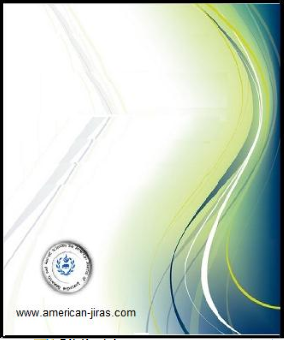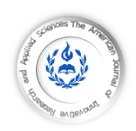
GENERAL INFORMATION
| HOME | ABOUT US | ARCHIVE | AIMS AND SCOP | AUTHORS | REVIEW | SUMIBMIT MANUSCRIPT | EDITORIAL BOARED | PUBLICATION FEE |

| HOME || ABOUT US || ARCHIVES || AIMS AND SCOP || AUTHORS || REVIEW|| SUBMIT MANUSCRIPT || EDITORIAL BOARD |

| Info-AJIRAS-® Journal ISSN 2429-5396 (Online) / Reference CIF/15/0289M |
American Journal of Innovative Research & Applied Sciences

|
American Journal of innovative
Research & Applied Sciences
Research & Applied Sciences
ISSN 2429-5396 (Online)
OCLC Number: 920041286
OCLC Number: 920041286

Authors Contact
*Correspondant author and authors Copyright © 2024:
| Abdoussalam Badrou-Dini 1*| Rabemanantsoa Heriniaina Joslin 2 | Rakotoniriana Bona Michel
Jimmy | Randriazanamparany Michel Aimé | et | Raminosoa Chrysostôme Roger Raymond |
Affiliation.
1. Université d’Antsiranana| École doctorale thématique, Énergie renouvelable et Environnement| B.P 0 Antsiranana 201 | Madagascar |
2. Université d’Antsiranana | École Supérieure Polytechnique | B.P 0 Antsiranana 201 | Madagascar |
This article is made freely available as part of this journal's Open Access:
| DOI: https://doi.org/10.5281/zenodo.11489220 |
*Correspondant author and authors Copyright © 2024:
| Abdoussalam Badrou-Dini 1*| Rabemanantsoa Heriniaina Joslin 2 | Rakotoniriana Bona Michel
Jimmy | Randriazanamparany Michel Aimé | et | Raminosoa Chrysostôme Roger Raymond |
Affiliation.
1. Université d’Antsiranana| École doctorale thématique, Énergie renouvelable et Environnement| B.P 0 Antsiranana 201 | Madagascar |
2. Université d’Antsiranana | École Supérieure Polytechnique | B.P 0 Antsiranana 201 | Madagascar |
This article is made freely available as part of this journal's Open Access:
| DOI: https://doi.org/10.5281/zenodo.11489220 |



| ISSN: 2429-5396 (e) | https://www.american-jiras.com | |
| Web Site Form: v 0.1.05 | JF 22 Cours, Wellington le Clairval, Lillebonne | France |
| Web Site Form: v 0.1.05 | JF 22 Cours, Wellington le Clairval, Lillebonne | France |
Abstarct7-December-2023

| JUNE 18 | ISSUE N° 6 | 2024 |
| ARTICLES | Am. J. innov. res. appl. sci. Volume 18, Issue - 6 Pages 23-31 (June, 2024)
| ARTICLES | Am. J. innov. res. appl. sci. Volume 18, Issue - 6 Pages 23-31 (June, 2024)
RESUME
Contexte : Le processus de conversion photovoltaïque génère de la chaleur, une réalité qui, sans précaution, peut entrainer une diminution significative de l’efficacité des modules solaires. C’est dans ce contexte que le refroidissement à eau est intéressant en exploitant ses propriétés thermiques. Cela permet d’améliorer le rendement électrique des cellules photovoltaïques. Objectif : L'objectif principal est d'évaluer l'impact du refroidissement à l'eau sur les performances d'un panneau solaire, en comparaison avec un panneau sans système de refroidissement. Méthodes : Deux panneaux solaires identiques ont été utilisés dans les deux configurations, avec l'un équipé d'un système de refroidissement à eau et l'autre fonctionnant sans refroidissement. Des mesures de tensions et courants, de la température de fonctionnement, et d'autres paramètres importants ont été collectées pendant une période définie. Résultats : Les résultats ont montré une amélioration significative du rendement électrique du panneau solaire refroidi à l'eau par rapport à celui non refroidi, notamment lors des périodes de chaleur intense.
Mots-clés: cellules photovoltaïques, température, impact, rendement électrique.
ABSTRACT
Context: The photovoltaic conversion process generates heat, a reality that, without precautions, can lead to a significant decrease in the efficiency of solar modules. It is in this context that water cooling becomes interesting by leveraging the thermal properties of water to maintain the temperature of solar cells at lower levels. This will enhance the electrical efficiency of the photovoltaic cells. Objective: The main objective is to assess the impact of water cooling on the performance of a solar panel, compared to a panel without a cooling system. Methods: Two identical solar panels were used in both configurations, with one equipped with a water-cooling system and the other operating without cooling. Voltage and current measurements, operating temperature, and other important parameters were collected during a specified period. Results: The water-cooled solar panel demonstrated lower average operating temperatures compared to the non-cooled panel. The results showed a significant improvement in the electrical efficiency of the water-cooled solar panel, especially during periods of intense heat.
Keywords: Photovoltaic Cells, Temperature, Impact, Electrical Efficiency.
Contexte : Le processus de conversion photovoltaïque génère de la chaleur, une réalité qui, sans précaution, peut entrainer une diminution significative de l’efficacité des modules solaires. C’est dans ce contexte que le refroidissement à eau est intéressant en exploitant ses propriétés thermiques. Cela permet d’améliorer le rendement électrique des cellules photovoltaïques. Objectif : L'objectif principal est d'évaluer l'impact du refroidissement à l'eau sur les performances d'un panneau solaire, en comparaison avec un panneau sans système de refroidissement. Méthodes : Deux panneaux solaires identiques ont été utilisés dans les deux configurations, avec l'un équipé d'un système de refroidissement à eau et l'autre fonctionnant sans refroidissement. Des mesures de tensions et courants, de la température de fonctionnement, et d'autres paramètres importants ont été collectées pendant une période définie. Résultats : Les résultats ont montré une amélioration significative du rendement électrique du panneau solaire refroidi à l'eau par rapport à celui non refroidi, notamment lors des périodes de chaleur intense.
Mots-clés: cellules photovoltaïques, température, impact, rendement électrique.
ABSTRACT
Context: The photovoltaic conversion process generates heat, a reality that, without precautions, can lead to a significant decrease in the efficiency of solar modules. It is in this context that water cooling becomes interesting by leveraging the thermal properties of water to maintain the temperature of solar cells at lower levels. This will enhance the electrical efficiency of the photovoltaic cells. Objective: The main objective is to assess the impact of water cooling on the performance of a solar panel, compared to a panel without a cooling system. Methods: Two identical solar panels were used in both configurations, with one equipped with a water-cooling system and the other operating without cooling. Voltage and current measurements, operating temperature, and other important parameters were collected during a specified period. Results: The water-cooled solar panel demonstrated lower average operating temperatures compared to the non-cooled panel. The results showed a significant improvement in the electrical efficiency of the water-cooled solar panel, especially during periods of intense heat.
Keywords: Photovoltaic Cells, Temperature, Impact, Electrical Efficiency.
| Abdoussalam Badrou-Dini 1*| Rabemanantsoa Heriniaina Joslin 2 | Rakotoniriana Bona Michel Jimmy | Randriazanamparany
Michel Aimé | et | Raminosoa Chrysostôme Roger Raymond |. Am. J. innov. res. appl. sci. 2024; 18(6):23-31.
| PDF FULL TEXT | | XML FILE | | Abstract and Author Contact | | https://doi.org/10.5281/zenodo.11489220 |